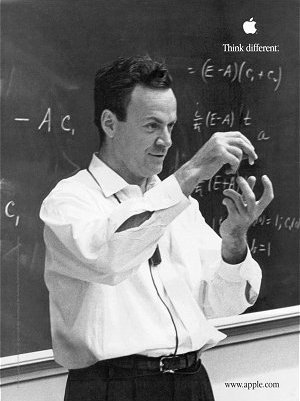 1
1
Although I’m terrible at mathematics and physics, after I read books about the physicist Richard P. Feynman, I wished I could be more like him if I didn’t exactly aspire to be Richard Feynman. Feynman came to public light for many people as he was very much involved in the investigation of the Challenger shuttle disaster in 1986, eventually solving the riddle of what went wrong. Unfortunately, NASA will have to solve their own mysteries in future as Feynman died of abdominal cancer in 1988.
What I found most intriguing about Feynman was how he looked at the world and problems in it. Somehow he had a completely different approach from most people, which enabled him to solve problems. Once you understood how he looked at a particular problem, often the solution was also very evident to you, or so recollections seemed to say in the various books and articles I’ve read previously about Feynman. I, too, fervently wish to “Think Different” and I am envious of his highly superior problem solving abilities.
In addition to being able to solve problems, Feynman was also quite well known for his ability to teach. I’m not sure if he truly loved teaching or if it was just something he felt strongly compelled to do. He did do a fair bit of it, which is something I share in common with him. The following quotation, on a web page with excerpts of Feynman’s thoughts on teaching, illustrates his dedication:
“I don’t believe I can really do without teaching. The reason is, I have to have something so that when I don’t have any ideas and I’m not getting anywhere I can say to myself, “At least I’m living; at least I’m doing something; I am making some contribution” — it’s just psychological.”
– Richard Feynman (as quoted in Druzdel 1995).2
As I later discovered, this is classic Feynman in rhythm and philosophy. Nowhere is his down-to-earth manner of thinking and communicating more apparent than in his various collections of anecdotes, such as Surely You’re Joking, Mr Feynman!, What Do You Care What Other People Think?, and The Pleasure of Finding Things Out. The first two I read years ago and are very approachable recollections mostly in his own words of events and people in Feynman’s life. The Pleasure of Finding Things Out is my latest Audible audio book (unabridged) and it is very much like Feynman sitting across the table from me, recounting his adventures in science and teaching.
He thought different, he was a curious character, and he thought he should teach: Feynman’s my hero!
References/Credits
1. Photo is of Apple’s Think Different Feynman poster. Original poster is copyrighted by Apple Computers, Inc.
2. Druzdel, Marek (1995) “Richard Feynman on Teaching” [online]. Available from: http://www.pitt.edu/~druzdzel/feynman.html [Accessed 2 October 2004].
Further Information
- “Surely You’re Joking, Mr Feynman!”: Adventures of a Curious Character by Richard P. Feynman, Edward Hutchings, and Ralph Leighton: Amazon.co.uk and Amazon.com
- What Do You Care What Other People Think?: Further Adventures of a Curious Character by Richard P. Feynman and Ralph Leighton: Amazon.co.uk and Amazon.com
- The Pleasure of Finding Things Out: The Best Short Works of Richard P. Feynman by Richard P. Feynman and Jeffrey Robbins: Amazon.co.uk and Amazon.com
Disclosure: Amazon links have a referrrer program link in them that generates revenue for an international discussion-based virtual community to which I belong. Your cost is not affected.






